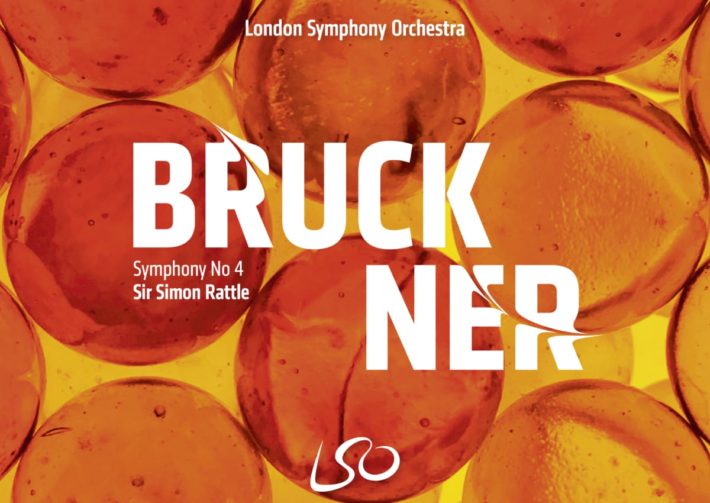Simon Rattle has taken his time exploring Bruckner’s symphonies. During his long tenure in Birmingham, he recorded only the seventh, while in Berlin there were albums of the fourth and the ninth symphonies, the latter distinctive by including a performing version of the unfinished finale. But this is the third symphony from his brief time as Music Director of the London Symphony Orchestra: a DVD of the eighth was released in 2018, and the sixth was released a year later, premiering a new edition by Benjamin-Gunnar Cohrs. This latest album is the premiere of Cohr’s 2021 critical edition of the fourth (Version 1878–81), which includes not only the complete symphony, but the composer’s discarded Scherzo and Finale, and extended versions of the second and fourth movements.
It also makes a very complicated situation for collectors of this symphony, because we now have 10 different versions from which to choose: Bruckner’s original 1874-1876 Version A; Version 2A which includes edits made in 1878; Version 2B which includes edits made between 1881-1886, and a 1888 ‘final’ version. Version 2B is the most widely known version, since both the Haas and Nowak editions fall into this group.
It is well known that Bruckner incessantly revised his symphonies, for reasons both personal and professional. And while there is certainly a select number of people who enjoy comparing recordings of the various editions, we may have reached a saturation point, because it seems impossible to say which version represents Bruckner’s ultimate thoughts. To be perfectly clear, Cohrs writes that this is a recording of “the second version of the ‘Romantic’ Symphony as it stood by the end of 1881…also respecting here for the first time Bruckner’s own suggested cut in the Finale.”
Rattle has grown and matured as a Bruckner interpreter. He has developed a sure sense of energizing and sustaining Bruckner’s long phrases. His feeling for the work’s architecture ensures each section flows into the next with an organic naturalness. The slow movement never seems episodic (his quick tempo helps with this) and the finale has an impressive inevitability. The scherzo’s second trio, with particularly beguiling playing from the LSO woodwinds, gives the music a delicateness that is most touching. The carefully prepared climaxes arrive with unforced grandeur. Speeds tend to the quick side, with precise and rounded orchestral playing – in fact, it often reminded me of conductor Christian Thielemann’s ideal Bruckner sound, which he described as “a roundness without any blurriness or mistiness, a clarity with a gentle edge to it.”
Related
- Review: Bruckner – Symphony No. 4 – Vienna Philharmonic, Thielemann
- Review: Bruckner – Symphonies No. 2 & 8 – Gewandhausorchester Leipzig, Nelsons
- Review: Bruckner – Symphony No. 6 – BBC Philharmonic, Mena
But the London Symphony Orchestra, at least as recorded here, lacks the tonal sumptuous heard from the great Bruckner orchestras of Amsterdam, Berlin, and Vienna. And many would push back on Thielemann’s view, arguing that Bruckner’s more rambunctious music (as in the Scherzo of this symphony) requires a sharper attack, with steeler sound in which brass dominates the orchestral color, as if Bruckner as organist has just added the organ’s largest reed stop to his registration.
Frustratingly, the playing lacks the intensity found in Böhm’s famous Vienna recording, or Blomstedt’s San Francisco performance on Decca. I wonder if the performance, which was not made in the Barbican, but in Jerwood Hall at LSO St. Luke’s in October 2021, was not recorded in front of an audience because of Covid, and therefore lacks the spark of playing a live performance.
The recording itself is disappointing, with a mid-range tubbiness that robs the highest registers of brilliance. Timpani often sounds muffled, and the brass, especially horns, do not cut through the texture as they should. Rattle, like several other conductors, does not play the final chord of the first and last movements with a forceful, sharp attack, instead elongating and rounding the sound, an effect very much the opposite of what Bruckner intended. In the scheme of things, it is a small issue, but for me it really does weaken the power of those two endings.
The second CD, featuring the discarded and extended movements, is interesting, but only serves to prove that Bruckner’s later choices were significant improvements. Rattle and the orchestra apparently toured this program, with Rattle discussing the various movements being performed. Assuming those remarks were prepared in advance, it is a shame those notes are not included here. There is a short introductory note by Benjamin Gunnar-Cohrs, but discussion of the edition, including the rejected Scherzo and Finale, are written by Stephen Johnson. Johnson is of course an excellent and informative writer, but would it not have been even better to have Gunnar-Cohrs provide a more detailed discussion of his work?

Bruckner – Symphony No. 4
London Symphony Orchestra
Simon Rattle – Conductor
LSO Live, CD LSO0875
Recommended Comparisons
Read more classical music reviews or visit The Classic Review Amazon store











